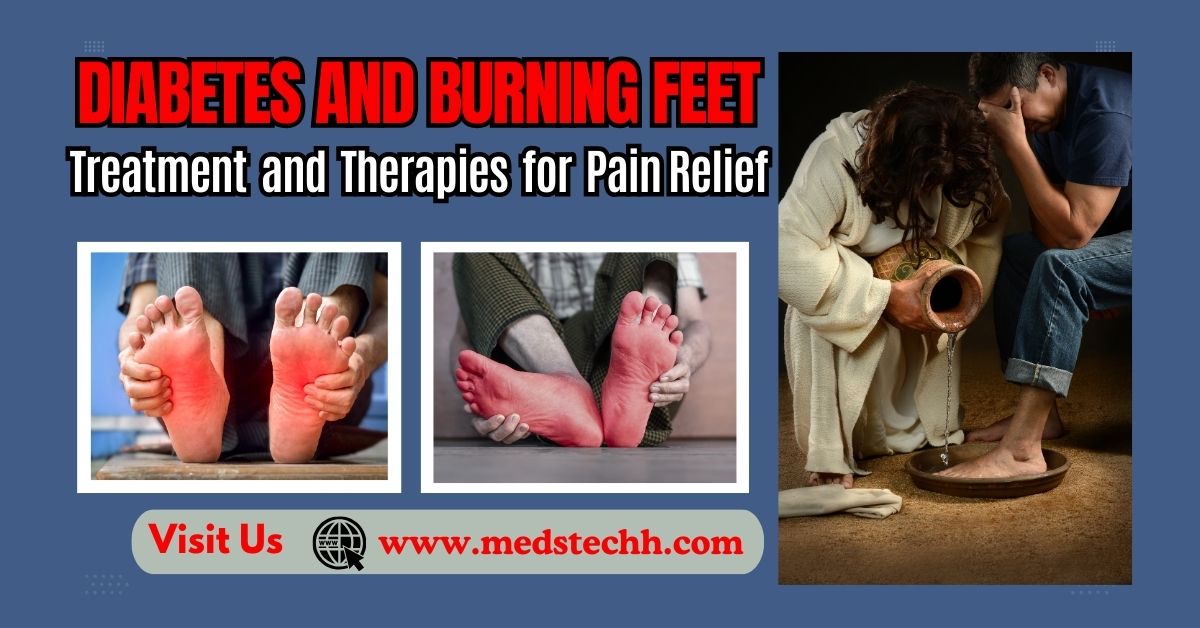Introduction:
Burning feet, medically known as “erythromelalgia,” is a condition characterized by a sensation of heat, pain, or discomfort in the feet. It can be a perplexing and distressing issue for many individuals, particularly those with underlying health conditions like diabetes. Understanding the types, causes, and treatment options for burning feet is crucial for effective management and relief.
What is Burning Feet?
Burning of feet is a medical condition that causes a sensation of burning, tingling, or numbness in the feet. It can occur spontaneously or persistently and may affect one or both feet. The symptoms can range from mild to severe, interfering with daily activities and quality of life.
Causes of Burning Feet:
- Neuropathy: Damage to the nerves, often due to diabetes or other metabolic disorders.
- Circulatory Issues: Reduced blood flow to the feet, leading to inadequate oxygen supply.
- Nerve Entrapment: Compression or irritation of nerves in the feet, such as in tarsal tunnel syndrome.
Relationship between Burning Feet and Diabetes:
Diabetes is a leading cause of peripheral neuropathy, a condition characterized by nerve damage, particularly in the feet and hands. Elevated blood sugar levels over time can lead to nerve damage, resulting in symptoms like burning, tingling, or numbness in the feet.
Types of Burning Feet:
Burning feet can manifest in various forms, each with its unique characteristics and underlying mechanisms:
- Neuropathic Burning Feet
- This type of burning feet is primarily associated with nerve damage, often seen in individuals with diabetes or those with a history of alcohol abuse. Neuropathic burning feet may involve sensations of burning, tingling, or electric-like shocks.
- Peripheral Arterial Disease (PAD)
- PAD occurs when arteries leading to the extremities become narrowed or blocked, restricting blood flow. This can result in symptoms like burning or cramping pain in the legs and feet, particularly during physical activity.
- Tarsal Tunnel Syndrome
- Similar to carpal tunnel syndrome in the hands, tarsal tunnel syndrome involves compression of the posterior tibial nerve as it passes through the tarsal tunnel on the inside of the ankle. This compression can lead to burning pain, tingling, or numbness in the feet.
Diabetes and Burning Feet:
The relationship between diabetes and burning feet is well-established, highlighting the importance of managing blood sugar levels effectively. Uncontrolled diabetes can lead to peripheral neuropathy, exacerbating symptoms of burning, tingling, or numbness in the feet.
Link between Diabetes and Peripheral Neuropathy:
Peripheral neuropathy is a common complication of diabetes, affecting up to half of all diabetic patients. High blood sugar levels can damage nerves throughout the body, leading to sensory disturbances like burning or tingling sensations in the feet.
Importance of Blood Sugar Control:
Maintaining stable blood sugar levels through proper diet, exercise, and medication is essential for preventing or managing diabetic neuropathy and associated symptoms like burning feet.
Symptoms of Burning Feet:
Recognizing the signs and symptoms of burning feet is crucial for early intervention and management. Common symptoms include:
- Sensation of Heat: Feeling of warmth or burning in the feet, often accompanied by redness.
- Tingling or Numbness: Pins-and-needles sensation or loss of sensation in the feet.
- Redness and Swelling: Inflammation and discoloration of the skin on the feet, particularly in the affected areas.
Treatment Options:
Effective management of burning feet involves addressing underlying causes and alleviating symptoms through various treatment modalities:
Medications for Pain Relief:
It is better to consult with your doctor or healthcare provider.
- Nonsteroidal anti-inflammatory drugs (NSAIDs) can help reduce inflammation and relieve pain associated with burning feet.
- Antidepressants and anticonvulsants are often recommended for the treatment of neuropathic pain.
Managing Underlying Conditions:
- Controlling blood sugar levels through diet, exercise, and medication is essential for diabetic patients.
- Treating underlying conditions like peripheral arterial disease or tarsal tunnel syndrome may involve medication, physical therapy, or surgery.
Physical Therapy and Exercise:
- Stretching exercises and physical therapy can help improve circulation and alleviate symptoms of burning feet.
- Low-impact exercises like swimming or cycling can promote cardiovascular health without exacerbating foot pain.
Self-Care Strategies:
Adopting self-care practices can help alleviate symptoms and improve overall foot health:
Proper Foot Care:
- Keep feet clean and dry to prevent infections and skin irritation.
- Trim toenails straight across to avoid ingrown nails and other complications.
Wearing Comfortable Footwear:
- Choose shoes with ample room for toes and good arch support to minimize pressure on the feet.
- Avoid high heels or tight-fitting shoes that can exacerbate discomfort.
Managing Stress:
- Stress, anxiety and depression can exacerbate symptoms of burning feet, so practicing relaxation techniques like deep breathing or meditation can be beneficial.
Prevention Tips:
Taking proactive measures to prevent burning feet can help maintain foot health and overall well-being:
Maintaining Healthy Blood Sugar Levels:
- Consistently monitor blood sugar levels and follow a balanced diet to prevent fluctuations.
- Take prescribed medications as directed by a healthcare provider to keep blood sugar levels within target ranges.
Regular Exercise Routine:
- Engage in regular physical activity to promote circulation and maintain cardiovascular health.
- Aim for at least 30 minutes of moderate exercise most days of the week, as recommended by healthcare professionals.
Avoiding Excessive Alcohol and Smoking:
- Limit alcohol consumption and avoid smoking, as both can contribute to nerve damage and circulatory issues that may exacerbate symptoms of burning feet.
Home Remedies:
Medical treatments and self-care practices, certain home remedies may provide temporary relief from burning feet:
- Epsom Salt Soak: Soaking feet in warm water with Epsom salt can help soothe sore muscles and reduce inflammation.
- Cold Water Soak: Alternating between cold and warm water soaks can improve circulation and alleviate discomfort in the feet.
- Massaging with Essential Oils: Massaging the feet with essential oils like lavender or peppermint can promote relaxation and reduce sensations of pain or burning.
When to See a Doctor?
While self-care measures and home remedies can often alleviate symptoms of burning feet, it’s essential to seek medical attention if symptoms persist or worsen:
- Persistent Symptoms: If burning feet symptoms persist despite home treatment or worsen over time.
- Worsening Pain: If burning sensations are accompanied by severe or debilitating pain.
- Difficulty Walking: If burning feet symptoms interfere with daily activities or mobility.
Living with Burning Feet:
Living with burning feet can pose challenges, but there are strategies and resources available to help individuals cope with this condition:
Coping Mechanisms:
- Engage in stress-reducing activities like yoga or meditation to alleviate symptoms of burning feet.
- Engage with support groups or virtual communities to exchange experiences and seek guidance from other people.
Conclusion:
Burning feet can significantly impact daily life and mobility, particularly for individuals with underlying health conditions like diabetes. By understanding the types, causes, and treatment options for burning feet, individuals can take proactive steps to manage symptoms effectively and improve overall foot health.
FAQs
- What causes burning feet sensation?
- Burning feet sensation can be caused by various factors, including neuropathy, circulatory issues, or nerve entrapment.
- Can burning feet be a sign of diabetes?
- Yes, burning feet can be a symptom of peripheral neuropathy, a common complication of diabetes resulting from nerve damage.
- How can I relieve burning feet at home?
- Home remedies like Epsom salt soaks, cold water soaks, and massaging with essential oils may provide temporary relief from burning feet symptoms.
- Is burning feet a serious condition?
- While burning feet can be uncomfortable, it is not always a serious condition. However, persistent or worsening symptoms may require medical attention.
- Can burning feet affect my daily activities?
- Yes, severe or persistent burning feet symptoms can interfere with daily activities and mobility, impacting quality of life. It’s advisable to consult a medical professional for appropriate management.




I抦 now not certain where you’re getting your information, however good topic. I must spend some time finding out much more or working out more. Thank you for wonderful information I was in search of this info for my mission.